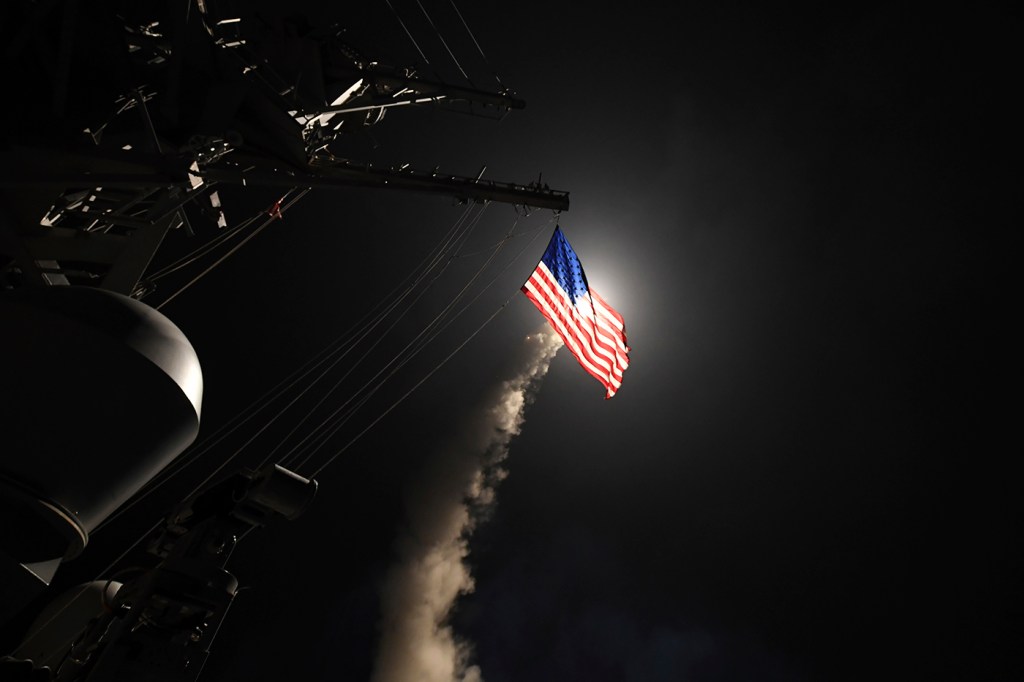The global implications of Trump’s Syria strike

The U.S. launched more than four dozen Tomahawk cruise missiles at Syria’s Al Shayrat airfield on Thursday in response to the Syrian government’s chemical weapons attack a few days earlier, drawing varying responses from the global community.
“It is in the vital national security interest of the United States to prevent and deter the spread and use of deadly chemical weapons,” President Donald Trump said following the missile attack. “Years of previous attempts at changing Assad’s behavior have all failed, and failed very dramatically,” he added, referring to Syrian President Bashar al-Assad.
We asked assistant professor of political science Max Abrahms, a terrorism theorist in the College of Social Sciences and Humanities, to discuss the global implications of the U.S. military strike, which came just 77 days into the Trump administration.
First and foremost, do you think the Trump administration’s intervention in Syria was a symbolic show of force or something more?
The BBC asked me the same question as the news of the U.S. airstrikes was breaking. On the evening of April 6, I was less sure about how to answer this question. It was unclear to me then whether the 59 Tomahawak cruise missile strikes were intended as a deterrent message to the Assad regime against using chemical weapons or as the opening salvo to remove him militarily. The strikes were directed against the Shayrat Air Base in direct response to the Khan Shaykhun April 4 chemical attack. But did these strikes herald a dramatic turn in Trump’s strategy in favor of regime change?
During the bitter presidential election campaign, Trump had sought to distinguish himself from his Democratic and Republican rivals by opposing the removal of Assad. And upon assuming the presidency, Trump emphasized that his beef in Syria focused on the Islamic State group, not Assad. After the chemical attack, however, Trump announced that the images of gassed children “had a big impact on me” and then authorized the attacks on the regime assets. As the dust has settled over the past few days, it seems that the U.S. retaliatory strikes were intended only to be a warning about the costs of using chemical weapons.
Secretary of State Rex Tillerson told CBS’ Face the Nation: “Our priority in Syria…really hasn’t changed…First and foremost, we must defeat ISIS.” There does remain some confusion, though, in terms of our longer-term policy in Syria, as United Nations Ambassador Nikki Haley noted on CNN’s State of the Union, “There is no political solution that any of us can see with Assad at the lead.”
Russian President Vladimir Putin is a staunch ally of Syrian President Bashar al-Assad. How do you predict the U.S. strike in Syria will impact U.S.-Russia relations going forward?
What most Americans haven’t appreciated is that Russia cares a lot more about Syria than we do. Syria has been Russia’s most reliable Middle East proxy since the Cold War. If you think the American press devotes a lot of coverage to Syria, you should watch the Russian press, especially since September 2015, when Russia intervened to prevent Assad from falling. Trump is kidding himself if he thinks the Tomahawk strikes against the airfield will cow Putin into relinquishing Russian support for Assad. Not only is it important to understand the strong historical ties between Russia and the Assad dynasty, but Russia has already responded to the U.S. strikes by boosting military and rhetorical support for Assad. Alarmingly, Russia has also responded by closing down a hotline with the United States that was created to avoid midair collisions over Syrian airspace. As the Nobel laureate Thomas Schelling warned, escalation is dangerous because it “leaves something to chance” by increasing the odds of potentially dire, unintended consequences.
My hope is that the U.S. and Russia will not allow the Syria conflict to further erode bilateral relations. Tillerson is scheduled to travel to Moscow on Wednesday. While I don’t expect the two superpowers to get on the same page, I hope they manage to cool tensions over the escalation in Syria.
“If Syria collapses,” wrote New York Times’ chief Washington correspondent David Sanger, “it could become a haven for Islamic terrorists, the exact situation that Mr. Trump is trying to prevent.” If the Assad regime is eventually toppled, who, in your opinion, might come in to fill that power vacuum?
I am not a proponent of U.S.-led regime change, especially in the Muslim world. In fact, there has never been a successful case of U.S.-led regime change in the Muslim world. Most recently, we made this mistake in Iraq and Libya. Toppling the leaders of those countries contributed greatly to the Syria conflict by creating power vacuums that were filled by new terrorist actors like the Islamic State group.
Even U.S. military actions short of removing the leader can backfire. Under Obama, the rebel program in Syria ended up aiding the al-Qaida-laced opposition and stoking the war. The political science literature has found that civil wars are most likely to end when one side exhibits military dominance. The external support for the rebels essentially propped up the weaker side, inadvertently prolonging the conflict. Similarly, I worry that continued U.S. strikes against Assad would even out the balance of forces in Syria and thereby perpetuate the war. Regime change is an even worse option because al-Qaida-types would then take over a larger part of the country. I understand that it would be emotionally satisfying to remove a leader who allegedly gassed his own people, but it’s not the smart thing for American interests or arguably Syrian interests either.





